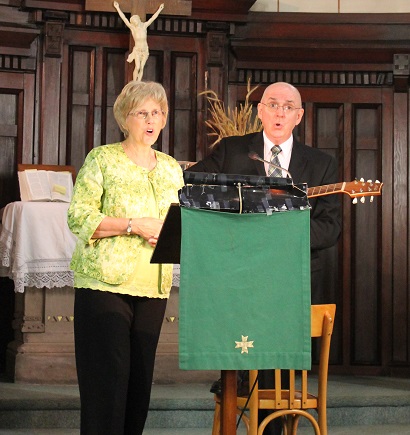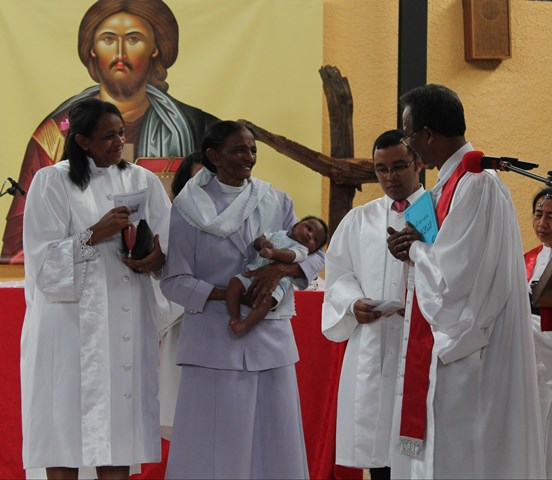By Ashleigh Bugg
Julie and David Brown hurry onto the crowded metro in Paris. They’ve finished singing and preaching at a traditional French Protestant church and are on their way to the outskirts of the city to worship with immigrants from Madagascar.
“Do we have time to visit the Haitian church, too?” David asks. They check the metro map but realize they won’t be able to make the service.
“Next time,” Julie says.
“We usually visit two to three new churches every Sunday,” David explains. Since moving to Paris in February, Cooperative Baptist Fellowship field personnel David and Julie Brown are in charge of an initiative known as Mosaic.
Mosaic is a ministry of the French Protestant Federation that promotes contact between churches and believers from different countries of the world, he says.
After working with immigrants in Marseilles, the Browns were asked to direct Mosaic in Paris and moved their lives to a new city.
“We didn’t think we would leave Marseilles, but God had other plans,” David says.
Bridging gulfs of culture and faith
The purpose of Mosaic is to create a ministry that connects French Protestant churches with the more than 400 immigrant churches in the Paris region.
“Mosaic is a bridge between historic French churches and the more recently arrived immigrant churches,” David says.
In art, a mosaic is formed by bringing smaller, multicolored pieces together to make a beautiful whole. This practice is seen in ancient pottery and stained glass cathedrals: a testament to an encompassing story. For the Browns, when varied churches work together, this embodies the mission they want to share with others.

“We try to do ministry like Jesus, responding to spiritual needs but also to the physical,” notes David, a pastor and musician who has served in Burkina Faso, North Africa, France and the United States.
“In a world that is more and more divided, we can find common ground.”
The Browns also volunteer in other ways. Julie is a registered nurse and volunteers with Doctors of the World, an organization that provides health care for refugees, asylum seekers and migrants.
“We often work with undocumented people, people who are denied access to health care,” Julie emphasizes.
Although they use their gifts of nursing and music, the Browns’ ultimate focus is Mosaic.
“We’re still in the learning stages,” he says. “Right now we’re trying to connect with as many churches as possible.”
‘The biggest challenge’
The task can seem impossible with more than 400 immigrant churches with members from a multitude of countries and ethnicities. The churches are spread over the Paris region, which has a population of more than 12 million. The center of Paris is made up of 20 different neighborhoods. It can take over an hour to travel by metro from one part of the city to another.
The Browns are working closely with local pastors and young people in their planning and are mapping the locations of the churches. Their goal is to eventually divide the region into four zones.
Opposition remains although there have been successes.
“The biggest challenge is for the French churches to see the need,” David says.
Many Protestant churches live with a persecuted mindset, stemming from religious wars dating from the 1500s. It can be hard for some French congregations to overcome the past.
As is the case in many countries, there is a fear of those that are different.
“This leads to a strong anti-immigrant feeling in France,” Julie says.
David agrees: “I had a French pastor tell me once, ‘we don’t want our church to have too many people of color because the French won’t come.’”
‘The most troubled countries’
The Browns remain hopeful despite the challenges confronting them.
“We often quote Ephesians 4:4 for our mission,” David says. “We believe in unity in the body of Christ.”
This isn’t the first time the Browns have worked with immigrants and refugees. In 2008, they were honored as TIP Report Heroes Acting to End Modern Slavery by the U.S. Department of State for their work with human trafficking survivors in North Africa. In Marseilles, they also worked with migrants, often reaching out to Muslims. This included the creation of a women’s group.
“It was a safe place for Muslim women to come and feel free to talk about women’s issues, life, faith, and just have fun and fellowship,” says Julie, who ran the group.
“We are passionate about how Muslims and Christians can live together in peace,” David adds. “We’ve learned so much from our Muslim friends. Interreligious friendship and discourse is important to us.”
‘From the four corners of the Earth’
Many of the groups David and Julie worship with have left their home countries for political, war-related and economic reasons. The Browns engage and welcome all.
“Paris is truly an international city with people from all around the world,” David says. “We’ve encountered travelers from many of the most troubled countries.”
The Browns’ work in Paris centers on the idea of international cooperation. They want to help French churches and their immigrant counterparts work together to better their communities and share the love of Christ.
“We’re not trying to reinvent the wheel,” David says. He maintains the resources are already in the community.
David and Julie tell a story about visiting a Punjabi church in Paris. Punjab is an area of Pakistan that was divided between India and Pakistan in 1947. Today it is still a place of conflict and violence between Pakistanis and Indians. The Browns entered the church, unsure what they would find.

Inside, Pakistanis and Indians embraced and shared tea. They were laughing and worshiping together. David was invited by the pastor to help with further theological studies and church administration. For the Browns this was a living example of the Mosaic initiative: overcoming differences to become whole.
“These groups literally come from the four corners of the Earth,” David says.
One Mosaic activity is a monthly luncheon for French and immigrant pastors and leaders.
“It is amazing to see pastors and church leaders from different cultures, with differing points of view on life and theology, sharing a meal together,” David says.
